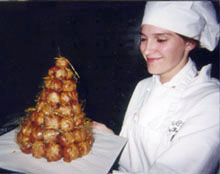Pastry






Pastry is a dough of flour, water and shortening (solid fats, including butter) that may be savoury or sweetened. Sweetened pastries are often described as bakers' confectionery. The word "pastries" suggests many kinds of baked products made from ingredients such as flour, sugar, milk, butter, shortening, baking powder, and eggs. Small tarts and other sweet baked products are called pastries. Common pastry dishes include pies, tarts, quiches, and pasties.
Types of Pastry[edit]
The main types of pastry are:
- Shortcrust pastry: The simplest and most common pastry. It is made with flour, fat, and water to bind the dough. This is used for tarts, pies, and quiches.
- Puff pastry: Made with several layers of fat which are folded into the dough to create a flaky, light pastry after baking. It is used for pastries like croissants, Danish pastries, and vol-au-vents.
- Choux pastry: A light pastry dough used to make éclairs, cream puffs, and profiteroles. It employs high moisture content to create steam during cooking to puff the pastry.
- Filo pastry: A very thin unleavened dough used for making pastries like baklava and börek in Middle Eastern and Balkan cuisines.
- Hot water crust pastry: A type of pastry used for savory pies, such as pork pies, game pies, and, more rarely, steak and kidney pies. Hot water crust is traditionally used for making hand-raised pies.
Ingredients[edit]
The primary ingredients in pastry making include:
- Flour: The basic structure of the pastry. Wheat flour is the most common type used.
- Fats: Including butter, lard, or vegetable shortening. Fats are incorporated into the dough to give the pastry its texture.
- Liquids: Water, milk, or eggs are used to bind the dough and affect the tenderness and flakiness of the finished product.
- Sugar: Added for sweetness and to tenderize the pastry.
- Leavening agents: Such as baking powder or yeast, may be used in some pastries to produce a lighter, airier texture.
Preparation and Techniques[edit]
Pastry making involves various techniques that affect the texture and flavor of the finished product. These include:
- Rubbing in: A method where fat is rubbed into the flour before adding any liquid to make breadcrumbs-like texture.
- Folding: Used in making puff pastry, where the dough is repeatedly folded and rolled to create layers.
- Blind baking: Pre-baking the pastry crust before adding the filling to prevent it from becoming soggy.
- Glazing: Applying egg or milk wash before baking to give the pastry a golden and glossy finish.
Cultural Significance[edit]
Pastry has a significant place in various cultures around the world, with each having its unique variations and specialties. For example, in France, pastries like croissants and éclairs are an integral part of the cuisine. In the Middle East, pastries such as baklava are traditionally served during festive occasions.
See Also[edit]
-
Pastry
-
Pastry
-
Pastry
-
Pastry
-
Pastry
-
Pastry
-
Pastry
-
Pastry
-
Pastry
-
Pastry
-
Pastry
-
Pastry
Ad. Transform your life with W8MD's Budget GLP-1 injections from $49.99


W8MD offers a medical weight loss program to lose weight in Philadelphia. Our physician-supervised medical weight loss provides:
- Weight loss injections in NYC (generic and brand names):
- Zepbound / Mounjaro, Wegovy / Ozempic, Saxenda
- Most insurances accepted or discounted self-pay rates. We will obtain insurance prior authorizations if needed.
- Generic GLP1 weight loss injections from $49.99 for the starting dose of Semaglutide and $65.00 for Tirzepatide.
- Also offer prescription weight loss medications including Phentermine, Qsymia, Diethylpropion, Contrave etc.
NYC weight loss doctor appointmentsNYC weight loss doctor appointments
Start your NYC weight loss journey today at our NYC medical weight loss and Philadelphia medical weight loss clinics.
- Call 718-946-5500 to lose weight in NYC or for medical weight loss in Philadelphia 215-676-2334.
- Tags:NYC medical weight loss, Philadelphia lose weight Zepbound NYC, Budget GLP1 weight loss injections, Wegovy Philadelphia, Wegovy NYC, Philadelphia medical weight loss, Brookly weight loss and Wegovy NYC
|
WikiMD's Wellness Encyclopedia |
| Let Food Be Thy Medicine Medicine Thy Food - Hippocrates |
Medical Disclaimer: WikiMD is not a substitute for professional medical advice. The information on WikiMD is provided as an information resource only, may be incorrect, outdated or misleading, and is not to be used or relied on for any diagnostic or treatment purposes. Please consult your health care provider before making any healthcare decisions or for guidance about a specific medical condition. WikiMD expressly disclaims responsibility, and shall have no liability, for any damages, loss, injury, or liability whatsoever suffered as a result of your reliance on the information contained in this site. By visiting this site you agree to the foregoing terms and conditions, which may from time to time be changed or supplemented by WikiMD. If you do not agree to the foregoing terms and conditions, you should not enter or use this site. See full disclaimer.
Credits:Most images are courtesy of Wikimedia commons, and templates, categories Wikipedia, licensed under CC BY SA or similar.
Translate this page: - East Asian
中文,
日本,
한국어,
South Asian
हिन्दी,
தமிழ்,
తెలుగు,
Urdu,
ಕನ್ನಡ,
Southeast Asian
Indonesian,
Vietnamese,
Thai,
မြန်မာဘာသာ,
বাংলা
European
español,
Deutsch,
français,
Greek,
português do Brasil,
polski,
română,
русский,
Nederlands,
norsk,
svenska,
suomi,
Italian
Middle Eastern & African
عربى,
Turkish,
Persian,
Hebrew,
Afrikaans,
isiZulu,
Kiswahili,
Other
Bulgarian,
Hungarian,
Czech,
Swedish,
മലയാളം,
मराठी,
ਪੰਜਾਬੀ,
ગુજરાતી,
Portuguese,
Ukrainian












